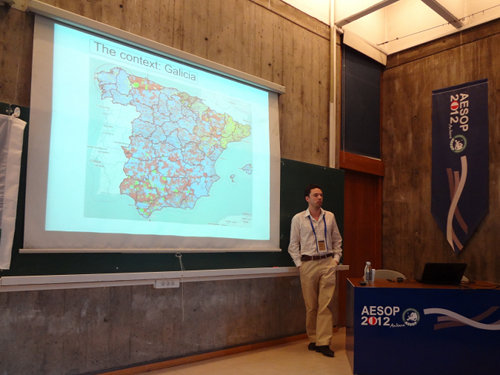Submitted by laborate on Thu, 14/08/2012 - 18:42 GMT.
The Land Laboratory participated in the conference the
European Association of Schools of Planning
(AESOP), which was held in Ankara (Turkey) from 11 to 15
July, with a presentation.

The presentation seeks to understand why currently in Galicia
there is a very small number of municipalities that have
adopted urban planning, while a majority have not done it
or still are in process.
Until the 60's of last century, Galicia was largely a rural
region. In those years the region experimented a huge economic
development, and one of the consequences was a massive migration
from countryside to the cities. Conversely, during the 90's
there was a phenomenon of counter-urbanization. The end
result is a plenty of 'rururban'
spaces, which are characterized by initially having rural
uses and currently a mix of the former with others of very
different nature, like residential or industrial.
To stop this disorder, in year 2002 the regional government
passed an act - lei de Ordenación Urbanística e Protección do Medio Rural de Galicia
- that forced municipalities to adopt urban planning. Despite
having spent near 10 years, compliance with this act is
far from being generalized: only 30 municipalities have
created a plan, while 222 are still in progress and 18 have
not even completed the very first steps.
The comparison of the situations of several municipalities
taking into account variables such as population density,
number of building permits, percentage of population engaged
in agroforestry activities or land prices does not explain
why similar municipalities have adopted opposite decisions
about meeting this law. However, it is possible to reach
some conclusions. Among the reasons that led some municipalities
to get a plan are facilitating new urban developments or
attracting industries to settle in their territory. Moreover,
among the reasons that lead to a majority of municipalities
to not getting a plan are the conflicts that arise from
different land uses or the belief that a plan will not solve
any existing problems.
Finally, it is worth mentioning that it was the 25th
edition of this conference. Many of the guest speakers told
that there is a need for planning in an increasingly uncertain
world.
links and downloads:
- conference web page: http://www.arber.com.tr/aesop2012.org/
- presentation "Aversion and attachment to rules. An institutional approach to understanding why localities adopt (or reject) land-use planning." [PDF; ~2.1 MB]